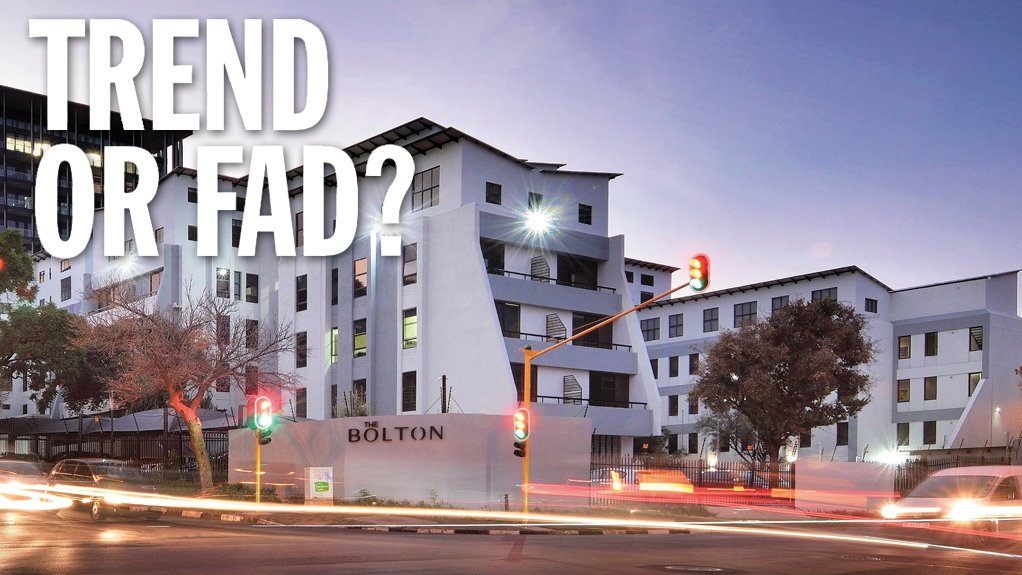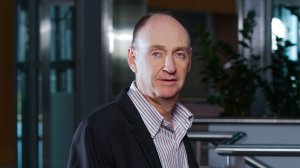Office-to-housing conversions hold some potential, but conditions apply




PAUL KOLLENBERG As long as the economy is not growing sufficiently to support business growth, the surplus office space will remain a challenge
ULANA VAN BILJON It is better for all stakeholders to repurpose a building than building from scratch
As South Africa looks to recover from the impacts of Covid-19, the viability of the trend of converting office buildings into residential properties is under scrutiny, with local and international interest having seemingly been piqued, building on the momentum those property companies dabbling in this before and during the pandemic were generating.
To explore the potential for this and to discern whether this is a new postpandemic trend or simply the cyclical nature of the property market, Engineering News & Mining Weekly spoke to JSE-listed real estate investment trusts Growthpoint Properties and Emira Property Fund.
Emira completed its R210-million residential conversion of The Bolton, in Rosebank, north of the Johannesburg central business district, in December 2019, prior to the pandemic and the consequences of lockdowns and remote working.
The urban lifestyle offered by The Bolton is the result of Emira’s value-enhancing conversion of two Rosebank office property assets, which were consolidated into one and which chemicals company Sasol had occupied for many years.
Emira’s partner, Feenstra Group, added its residential development and property management expertise to the project.
The Bolton offers many amenities – such as a swimming pool, a cinema, meeting rooms and free WiFi – but with smaller units that come at more affordable rentals, Emira highlights.
There are also a limited number of furnished, serviced units, specifically for corporate tenants in the area.
Emira CEO Ulana van Biljon explains there was a perceived market in the area for this conversion, and the asset was suitable for this purpose; therefore, the conversion made sense.
She says the market response following the conversion has been positive, drawing value rentals “right into the heart of Rosebank”, with the success of the project also being reflected in high occupancy rates.
Meanwhile, Growthpoint, in a joint venture with Setso Property Fund (49%) and in collaboration with BlackBrick Hotels, will undertake a R200-million office-to-housing conversion of its Riverwoods office park in Bedfordview, on Gauteng’s East Rand, in response to the surplus of office space in the market and the scarcity of residential space.
In its current form, the 35 000 m2 site has 10 000 m2 of space to repurpose as six two-storey buildings, which Growthpoint says are out of place in the St Andrews area, which, over time, has flourished into a sought-after and well-situated residential neighbourhood.
These buildings will be redesigned into 250-plus studio, one- and two-bedroom apartments, clustered around a large, social central courtyard with a water feature encircled by lawns, in addition to a clubhouse, pool and collaborative workspace, besides others.
Once the redevelopment is complete, Growthpoint will exit its investment in Riverwoods.
Setso, which specialises in office-to-residential conversions, is the development partner of BlackBrick Hotels, with two developments in Fredman Drive, Sandton, (both of which were converted from offices).
The persistently weak economy prior to the pandemic had already placed the office sector under considerable pressure, and this was exacerbated by the pandemic, says Growthpoint Asset Management: Office head Paul Kollenberg.
“As long as the economy isn’t growing sufficiently to support business growth, the surplus office space will remain a challenge.”
Moreover, Kollenberg adds there are some nodes where new developments have drawn tenants away from older buildings, leaving higher vacancies in these buildings.
“The new developments are predominantly let but were often developed at the top of the market, when tenants overestimated their growth requirements. These tenants are now looking to sublet some of this space, competing with traditional vacancies,” he explains.
Other property companies in the country have also been active in or are exploring the space.
For example, Arrowhead Properties said in May 2021 that it would look to convert unused offices into residential or storage facilities as demand for workspaces in South Africa dropped.
Africrest Properties, which owns one of the largest middle-income residential portfolios in South Africa, had also undertaken conversions in Marshalltown and Sunninghill, both in Johannesburg.
Beneficial Development
Van Biljon says these conversions are beneficial because they provide a means of repurposing older offices that no longer serve their purpose and of managing excess office supply.
It is better for all stakeholders to repurpose a building than build from scratch, she adds.
Kollenberg, meanwhile, says that conversions bring additional residential stock to the market, creating more choice for residents.
They also result in lower office vacancies, removing buildings from the market, and extend the life cycle of existing buildings, consequently contributing positively to carbon emissions savings.
Van Biljon says that, since the onset of the pandemic, the conversion trend has certainly received much more attention, owing to the media focus on working remotely and the oversupply of office space that is exacerbated by personnel not returning to work for safety reasons.
As a player in international markets, Emira has noted that more corporates are favouring a hybrid working model, whereby workers are returning to the office but are allowed to flexi-work, and the local market is also starting to follow this.
However, Van Biljon does note that opportunities for “conversion on the ground” are currently limited, as key aspects, such as the area, building layout, costs and perceived rental demand, have to be met.
“It all starts with knowing what will work, and choosing the right property,” Kollenberg elaborates, adding that, for example, the floorplate of a building must accommodate subdivision while allowing for light and ventilation.
He indicates that, while there is demand for residential units in good nodes, not every office is necessarily suitable for a residential conversion and many office buildings are too expensive for a conversion to be feasible.
Owing to these factors, there is currently nothing on Emira’s radar for conversions, but Van Biljon does not exclude potential future conversions and opportunities “because we always strive for best use of every asset [as] we know what is required for a successful conversion and one has to be patient”.
She indicates, however, that Emira’s properties in the greater Johannesburg area may have potential. If these were to be pursued, they would likely focus on the middle-income market, as this is where area and demand will coincide.
Meanwhile, Growthpoint’s core investment portfolio in South Africa has previously covered the traditional commercial property sectors – retail, offices and industrial real estate.
Kollenberg indicates that the company will explore pursuing more conversions – either in partnership with residential developers or independently – but will generally exit once the project is complete.
In the interim, the company is undertaking other measures to meet the growing demand for residential accommodation, which fall outside the ambit of conversions.
For example, Growthpoint is constructing a greenfield residential complex adjacent to the La Lucia shopping centre, in KwaZulu-Natal. Kollenberg says most of these units have already been sold to end-users.
Concurrently, Growthpoint, in partnership with its co-investors, has established the unlisted Growthpoint Student Accommodation Reit, and is developing two residential schemes close to the universities of the Witwatersrand and Cape Town.
Outlook
Kollenberg indicates that Growthpoint has “definitely seen” growing demand in retail and industrial properties as the pandemic continued.
“Tenants are returning to offices, recognising the importance of these, but we need to see economic growth . . . to make a substantial impact on office vacancies.”
As part of Growthpoint’s ongoing asset management, the company frequently evaluates the properties in its portfolio and considers all options to unlock the best value from its assets.
“There is no recipe and no single solution, so we take care to find the right approach unique to every building. We are also cognisant of conversions having to follow a more environment-friendly approach to development and being an important way of reducing carbon emissions,” Kollenberg outlines.
He says that, currently, the aforementioned Riverwoods Office Park, now known as Black Brick Bedford, is Growthpoint’s only property undergoing office-to-residential conversion.
Kollenberg says that this conversion is feasible, as the office park is situated in a primarily residential node.
Growthpoint will consider all target markets in pursuing further conversions, with the prospects having to be appropriate to the location.
“We attempt to identify demand before a redevelopment is commissioned to establish what the need is. We are also investigating the conversion of commercial properties into student accommodation,” adds Kollenberg.
Meanwhile, from Emira’s perspective, while it does see some potential in the conversion space, and the trend has garnered more interest since the pandemic, it does not regard this as the prevailing outlook for the property market moving forward.
“Bricks and mortar will always prevail, and there are always cycles of oversupply and undersupply. When the South African economy starts to have meaningful growth and we see signs of business growth, the property market will rebound too,” concludes Van Biljon.
Comments
Press Office
Announcements
What's On
Subscribe to improve your user experience...
Option 1 (equivalent of R125 a month):
Receive a weekly copy of Creamer Media's Engineering News & Mining Weekly magazine
(print copy for those in South Africa and e-magazine for those outside of South Africa)
Receive daily email newsletters
Access to full search results
Access archive of magazine back copies
Access to Projects in Progress
Access to ONE Research Report of your choice in PDF format
Option 2 (equivalent of R375 a month):
All benefits from Option 1
PLUS
Access to Creamer Media's Research Channel Africa for ALL Research Reports, in PDF format, on various industrial and mining sectors
including Electricity; Water; Energy Transition; Hydrogen; Roads, Rail and Ports; Coal; Gold; Platinum; Battery Metals; etc.
Already a subscriber?
Forgotten your password?
Receive weekly copy of Creamer Media's Engineering News & Mining Weekly magazine (print copy for those in South Africa and e-magazine for those outside of South Africa)
➕
Recieve daily email newsletters
➕
Access to full search results
➕
Access archive of magazine back copies
➕
Access to Projects in Progress
➕
Access to ONE Research Report of your choice in PDF format
RESEARCH CHANNEL AFRICA
R4500 (equivalent of R375 a month)
SUBSCRIBEAll benefits from Option 1
➕
Access to Creamer Media's Research Channel Africa for ALL Research Reports on various industrial and mining sectors, in PDF format, including on:
Electricity
➕
Water
➕
Energy Transition
➕
Hydrogen
➕
Roads, Rail and Ports
➕
Coal
➕
Gold
➕
Platinum
➕
Battery Metals
➕
etc.
Receive all benefits from Option 1 or Option 2 delivered to numerous people at your company
➕
Multiple User names and Passwords for simultaneous log-ins
➕
Intranet integration access to all in your organisation





















